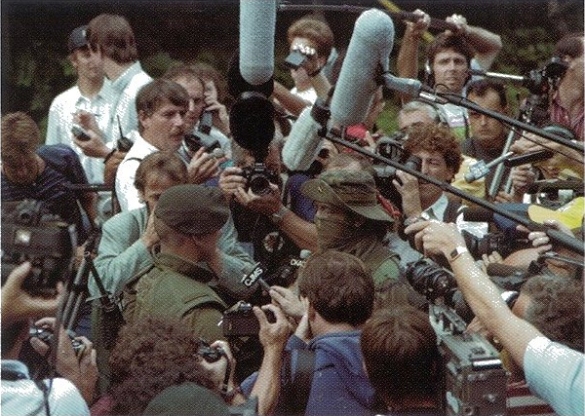What Impact Did the Oka Crisis Have On You?

mediaINDIGENA‘s own Waubgeshig Rice has a stellar piece in today’s Facts & Arguments section of the Globe about the 1990 Oka Crisis. (Although I’m frankly baffled, to put it charitably, by the accompanying picture.) In “Oka helped us find our voice,” Waub nails it when he writes: “We learned what it truly meant to be Aboriginal in this country because of what happened at Oka.”
To me, the ‘real’ anniversary of note for Oka Kanehsatake was the moment when the army was called in (Aug. 8, 1990) at the request of the province of Quebec. A somewhat-sprightly 22 years old at the time, I remember being both terrified and galvanized by such an overwhelming and over-the-top martial response by Canada to the legitimate grievances of the Mohawks of Kahnesatake Kanehsatake, a historical turning point that forged my consciousness as to what it meant when Indigenous peoples truly stood up for their right to say what happens on their ancestral lands — and the price you can pay when you do.
And as Waubgeshig so eloquently describes in his short essay, events at Oka Kanehsatake “inspired a whole generation of young native people in this country to discover who exactly they were, and where they fit in on a national scale.” Clearly, I was far from alone in coming to consciousness through the events leading up to and surrounding the Oka Crisis — the spark that arguably ignited a new era in Aboriginal awareness and activism. And because I was just one of many affected by these events, it’s lead me to wonder: What impact did that eventful summer have on others, then and now? What, as you see it and feel it, has been the personal and political legacy of this momentous time in modern North American Indigenous history? How did the Oka Crisis inspire and influence your life?
As always, both Aboriginal and non-Aboriginal viewpoints are encouraged.
[ Photo via Canadian Military History Gateway ]


After commenting on Doug George's misspelling of K A N E H S A T A K E (which isn't Oka, a nearby village), and the Montreal Gazette's failure to do minimal editing to correct said mistakes in his anti-warrior diatribe, I would be remiss not to slap rick's wrist for doing the same here.
Consider your wrist chastised.
I regret the error, and I deserve the lower case 'r' for my transgressionary typo.
Being 5 years old at the time of K-a-n-e-h-s-a-t-a-k-e (one of the many benefits of being a youth today – learning from others' mistakes!), I don't have any memories of watching the events unfold on T.V. or of hearing my parents and Elders converse on the subject. (It is regrettable, however, because my family came to Kitigan Zibi Anishinabeg from Lake of Two Mountains.)
What I've noticed in my generation is certain brand of “warrior” mentality amongst our youth. It doesn't suggest violence or animosity, as you've pointed out that Douglas Bland would suggest, but rather an enduring devotion to self-determination, our traditions, and future-oriented action. In my time at graduate school, my peers and I formed a group called the “Word Warriors” (based in Gerald Vizenor's and Dale Turner's uses of the term). We combined the tools provided to us by academia with essential grounding in our communities to work toward decolonization. Using our skills as writers, scholars, researchers, etc., a.k.a. our “ways with words,” we are fighting (or acting as “warriors”) to carve a meaningful space in which our people can thrive.
It surprises me that so many people under 20 – Indigenous and non – know so little if anything at all about the Canada Crisis (as I like to call it). Then again, it probably should surprise anyone considering it isn't in the history books. It isn't taught in a lot of mainstream politics classes. It isn't dealt with in a lot of government administration courses as a prime example of how bureaucrats and politicians manage to f**k things up generation after generation. So maybe the lesson to be learned is a hard one: That those who ignore (or are not taught) the lessons of history are doomed to repeat them.
BTW, I agree muchly with your second paragraph. We find ways to hold on to that which we hold dear, even if we sometimes don't know or are unaware of what it is we value.